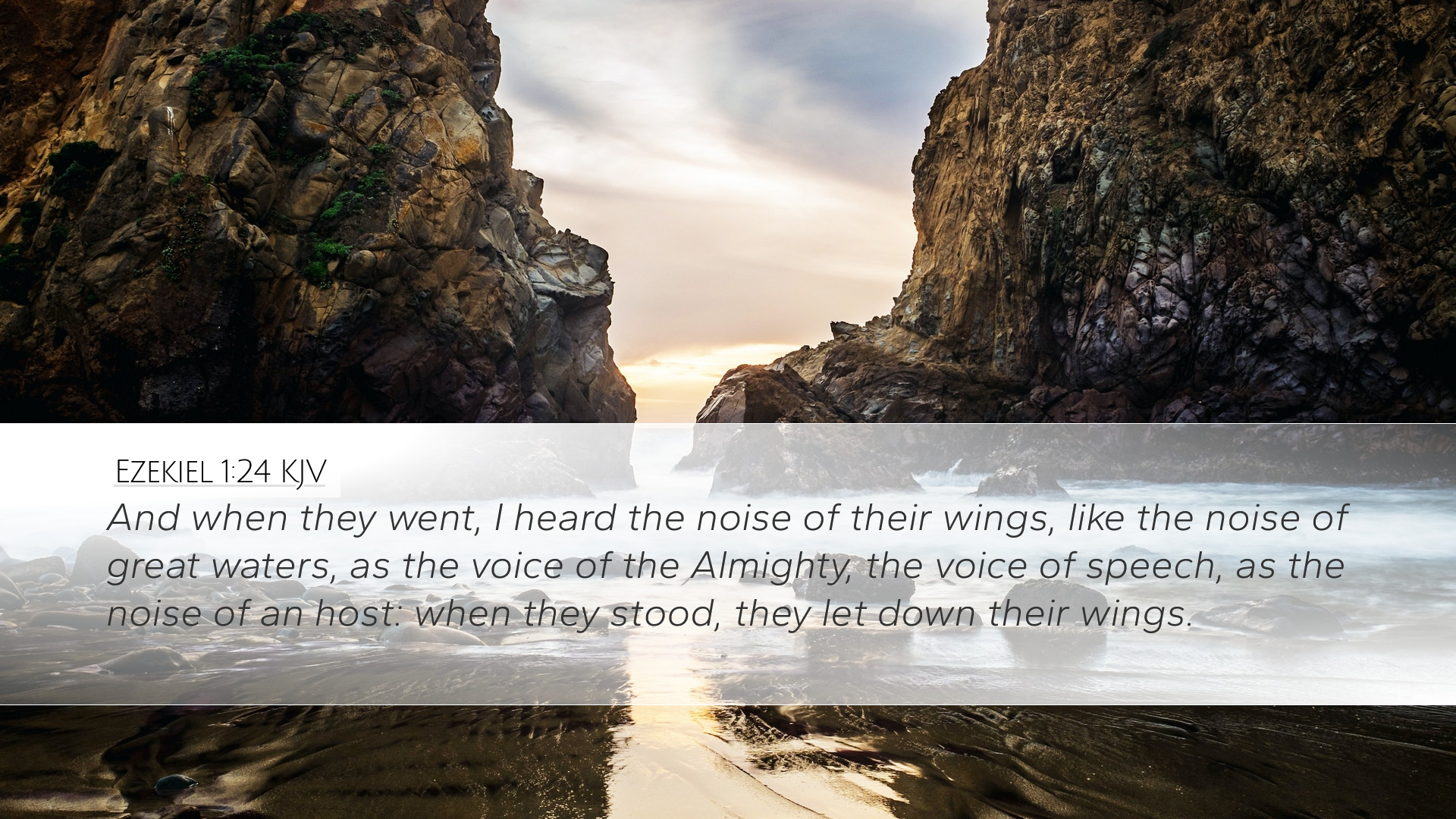Commentary on Ezekiel 1:24
Verse Context: Ezekiel 1:24 states, "And when they went, I heard the noise of their wings like the noise of great waters, as the voice of the Almighty, the voice of speech, as the noise of a host: when they stood, they let down their wings." This verse occurs within the prophet Ezekiel's remarkable vision of God's glory, revealing profound theological truths.
Introduction
The vision of Ezekiel is a complex yet deeply significant text that combines symbolic imagery with theological reflection. Past scholars, such as Matthew Henry, Albert Barnes, and Adam Clarke, provide insights that can contribute to a deeper understanding of Ezekiel 1:24.
Theological Implications
The noise of the wings in Ezekiel 1:24 serves multiple purposes:
- Manifestation of God's Power: The sound described as "the noise of great waters" evokes the overwhelming presence of God. This imagery, common in biblical literature, denotes majesty and divine authority, reminding the reader of the power of the Almighty.
- Symbolism of Divine Presence: The sound of the wings can be seen as a representation of the movement of God's spirit as it interacts with creation, suggesting that God is both transcendent and immanent.
- The Role of Angels: The wings symbolize the angels or seraphim who serve God's purposes. The noise signifies their active participation in divine affairs, underlining their importance as messengers and servants of God.
Insights from Commentaries
Matthew Henry
Matthew Henry emphasizes the enormity of the divine experience Ezekiel witnesses. He notes that the sound of the wings "was like the noise of great waters," symbolizing the immeasurable power of God. Henry describes this as a reminder to the Israelites of the vastness of God's authority and His ability to command the natural and spiritual realms. The noise produced by the wings reflects the harmony and order with which God orchestrates creation, providing comfort to those who feel dislocated or abandoned.
Albert Barnes
Albert Barnes interprets the phrase "like the noise of great waters" as indicative of divine majesty and the overwhelming presence of the Almighty. He elaborates on the vocalization aspect of the sound, stating it resembles "the voice of a host," thus connecting the noise to the military presence of God. This observation serves as an assurance of God's protective power over Israel. Barnes also notes that the imagery reflects the grandeur of worship involving celestial beings, thereby enriching the understanding of the divine assembly.
Adam Clarke
Adam Clarke approaches the passage with a focus on the cessation of the wings' noise when the beings stand, suggesting a moment of reverence and stillness in the presence of God. He posits that the transition from movement to stillness is significant as it demonstrates the awe instilled by God's holiness. Clarke emphasizes that this moment illustrates how God's creation responds to His presence, highlighting the seriousness and significance of divine encounters.
Practical Applications
For pastors, students, and theologians, the insights from Ezekiel 1:24 carry practical applications:
- Acknowledging God's Majesty: The text invites believers to recognize the majesty and power of God. It serves as a reminder of who is in control, particularly during times of chaos or uncertainty.
- Cultivating Reverence: The contrast between the noise of wings and the stillness when they stand encourages a posture of reverence in worship. This can lead to deeper interactions with the divine, fostering a sacred space for God's presence.
- Understanding the Role of Angels: This verse elucidates the presence and role of spiritual beings in God's plan. It invites reflection on the unseen world and the support believers have in the heavenly realms.
Conclusion
In conclusion, Ezekiel 1:24 offers not only a vivid portrayal of divine majesty but also serves as an essential text for understanding the interplay between God's power and the response of His creation. Through insights from Matthew Henry, Albert Barnes, and Adam Clarke, we gain a multi-faceted understanding of this passage that can enrich preaching, teaching, and personal study of Scripture.


